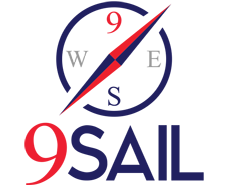At 9Sail, our staff has a firm understanding of all things related to both SEO (Search Engine Optimization) and PPC (Pay Per Click Advertising). However, we know that not all of our clients come to 9Sail with the same marketing background.
Because of this, we have created this glossary page that contains definitions to the terms and phrases we most consistently reference. If you have any additional questions or you would like further explanation of a specific term, please don’t hesitate in giving us a call!
Average Session Duration
Your site’s average session duration is the amount of time a user spends on your website.
Google Analytics compiles each session’s length and finds the mean of all times. From a content perspective, this is helpful, as it can help you determine if your content is being read, or simply clicked through.
It is a beneficial metric because by understanding how long people currently spend on your website, you can implement strategies to keep them on your site longer.
A good rule of thumb to remember is the longer your session durations are, the more actively engaged people are with your site’s content.
TL;DR: This metric lets you know how long people are staying on your website.
Backlink
A backlink refers to a link on another site that links back to your site. Backlinking can be done in a variety of ways, the most common of which being a guest blog.
Guest blogging is when you write a piece of content about your site, products, services, etc. and have it hosted on another website. The guest blog will internally hyperlink back to your site.
Guest blogging is a great way to get more backlinks and to boost your Domain Authority. When sites link back to your webpage, Google’s crawlers see this as an especially credible score, so your authority rises.
TL;DR: The more strong, legitimate backlinks you have, the more authoritative your site will seem.
Bounce Rate
Your site’s bounce rate is the percentage of visitors who visit your site through a single page, and immediately leave (or bounce) after, without going on to a second page.
TL;DR: If you’re seeing a high bounce rate, people are leaving your site after one page. They’re not continuing to explore through your other pages.
Domain Authority
Your site’s Domain Authority is a ranking score from 0-100. This is a multifaceted score, that is distinguished by compiling multiple metrics, including your backlinks, page load speed, internal links, and traffic, among other metrics.
A higher Domain Authority means your site is a more authoritative source of information, which is the goal!
TL;DR: The higher your Domain Authority, the stronger your website is.
Impressions
An impression happens whenever your content, whether it be an ad, a webpage,a video, etc. shows up in the SERP. An impression does not necessarily mean that your content is being clicked on and viewed (that would refer to a “Click”), but by appearing on that SERP, you’re increasingly likely to convert that impression into a click!
TL;DR: An impression happens any tie someone comes in contact with your content.
Keywords
Keywords are one of the most fundamental elements of SEO. Keywords are the terms people type into their search engines, that you want your page to show up for. Optimizing your content, and your website as a whole, for these keywords is a fantastic strategy to appearing on the SERPs and getting more traffic.
Branded Keywords
Branded keywords contain the specific brand name, whether that be a brand your business offers, or if that brand is part of your business’s name.
An example of a branded keyword would be if someone were to Google “9Sail SEO” if they were looking to reach 9Sail’s site. They mention the specific brand.
Another example would be someone searching for “Nike Running Shoes.” Nike is both the brand and the business. (Company Name +Service/Product)
TL;DR: Branded keywords include a specific brand.
Direct Keywords
Direct keywords are when someone specifically Googles your company’s name or address. (Simply the brand name)
TL;DR: Direct keywords directly mention the company’s name or address.
Discovery Keywords
Discovery keywords are used when a user searches for a product, service, or offering your specific website offers. An example of a discovery keyword would be someone Googling “Law Firm SEO in New Jersey.” It’s a service 9Sail offers, but the term 9Sail was not in the query.
TL;DR: Discovery keywords are general inquiries.
Number of Sessions Per User
This metric divides your site’s total number of users by the site’s total visits through the month, letting you know how many people visited your site multiple times through the given period.
TL;DR: If your site’s number of sessions per user is low, this means the majority of your traffic is not returning to your site for additional information.
Pages per Session
Pages per session counts how many different webpages users visited during a session on your site.
An actionable way to improve your Pages per Session percentage is to place an increased effort on internally linking to other webpages within a specific webpage. For example, if you’ve written a blog post on structuring your blog, this is a good opportunity to internally link within that article to a post on the importance of blogging.
This is an easy way to encourage users to visit more pages and spend more time on your site.
TL;DR: This metric might seem self-explanatory, but it indicates how many webpages people are looking at before exiting yout site.
Pageviews
Your pageviews is a summation of the total number of pages people viewed throughout the given period. One of your site’s goals should be to aim for having more pageviews than users, as this would increase your pages per session percentage!
TL;DR: The more pageviews you have, the better your site is doing, since more people are able to find and access the information you’re providing.
SERP – Search Engine Results Page
The SERP is the webpage that loads whenever you type a query into Google. One of the goals of Search Engine Optimization is to get your site ranking as high up on the SERP as possible.
Traffic Channels
Traffic Channels are the different ways people reach your website. Traffic refers to all users entering your site. With that in mind, think of your site as the destination and the channels as the specific roads they have to take to get to your site.
TL;DR: Traffic Channels are different ways people get to your website.
Direct
Direct traffic happens when a user types your specific web address into their browser. They are not using search engines or social media to get to your website; they are coming directly to your site.
An example of Direct traffic would be someone typing 9Sail.com into their web browser.
Organic Search
Traffic through organic search accounts for all users who visit your website through a search engine. Anyone who clicks on a Google link and is directed to your site comes through organic search.
An example of organic search traffic would be someone typing in “SEO in New Jersey” and clicking on 9Sail’s listing in the SERP.
Referral
Referral traffic is for viewers who come to your website after following a link posted on another website. Your site is being referred to through another site, and drawing users through the link.
An example of referral traffic would be someone following a link to 9Sail’s site from another website.
Social
Social traffic is everyone who gets to your website through social media. This could be by following a link on Facebook, Twitter, Instagram, or LinkedIn. You can include your website’s url in your social media bio in an attempt to boost your social traffic. You can also create posts that link back to specific webpages.
An example of social traffic would be someone clicking on 9Sail’s LinkedIn page and being brought to 9Sail’s website.
Sessions
A session is a user actively engaging with your site. A session counted from whenever a user enters your site, through the time they either hit X or go to another webpage.
TL;DR: A session is a users journey. It’s every page they click on between the time they enter your website and when they exit.
Users vs New Users
Google Analytics yields traffic information for both Users and New Users. When a user enters your site for the first time, they are counted as a New User. If they return back to your site later, they will then be counted as a User.
Cookies are traditionally saved on websites for 30 days, so if you enter 9Sail’s site on March 1 and return on March 17, your second visit will could you as a user instead of a new user. However, if you visited the site on March 1 and don’t return until April 18, you’ll be counted as a new user.
Ideally, you’ll want to have a strong amount of both Users and New Users, as it would show that you are not only actively catching the attention of new prospective leads, but that your site is showing enough value that users are returning back to it.
Helpful resources
Discover the power of effective digital marketing.
Sign up to receive 9Sail’s exclusive content and tactical tips, focused on helping law firms grow.
9Sail takes your privacy seriously and will only use your personal information to deliver communications you have requested of us. You can change your preferences at any time.

